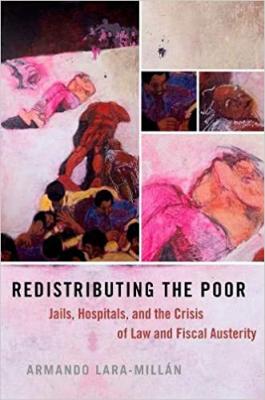Authors Meet Critics: Redistributing the Poor: Jails, Hospitals, and the Crisis of Law and Fiscal Austerity
Armando Lara-Millán, Assistant Professor, Department of Sociology, UC Berkeley
REGISTER
A Zoom link will be sent to registrants prior to the event.

Co-sponsored by the Center for the Study of Law and Society (CSLS)
Please join us on April 19, 2021 for an "Authors Meet Critics" book talk featuring Redistributing the Poor: Jails, Hospitals, and the Crisis of Law and Fiscal Austerity, by Armando Lara-Millán, Assistant Professor in the UC Berkeley Department of Sociology. This event is co-sponsored by the Center for Study of Law and Society (CSLS).
About the Book
Whenever the topic of large jails and public hospitals in urban America is raised, a single idea comes to mind. It is widely believed that because we as a society have disinvested from public health, the sick and poor now find themselves within the purview of criminal justice institutions. In Redistributing the Poor, ethnographer and historical sociologist Armando Lara-Millán takes us into the day-to-day operations of running the largest hospital and jail system in the world and argues that such received wisdom is a drastic mischaracterization of the way that states govern urban poverty at the turn of the 21st century. Rather than focus on our underinvestment of health and overinvestment of criminal justice, his idea of "redistributing the poor" draws attention to how state agencies circulate people between different institutional spaces in such a way that generates revenue for some agencies, cuts costs for others, and projects illusions that services have been legally rendered. By centering the state's use of redistribution, Lara-Millán shows how certain forms of social suffering — the premature death of mainly poor, people of color — are not a result of the state's failure to act, but instead the necessary outcome of so-called successful policy.
Panelists
Jonathan Simon is a Professor at Berkeley Law. He teaches in the areas of criminal law, criminal procedure, criminology, legal studies and the sociology of law. Simon’s scholarship concerns the role of crime and criminal justice in governing contemporary societies, risk and the law, and the history of the interdisciplinary study of law. His published works include over seventy articles and book chapters, and three single authored monographs, including: Poor Discipline: Parole and the Social Control of the Underclass (University of Chicago 1993, winner of the American Sociological Association’s sociology of law book prize, 1994), Governing through Crime: How the War on Crime Transformed American Democracy and Created a Culture of Fear (Oxford University Press 2007, winner of the American Society of Criminology, Hindelang Award 2010) and Mass Incarceration on Trial: A Remarkable Court Decision and the Future of Prisons in America (New Press 2014). Simon has served as the co-editor-in-chief of the journal, Punishment and Society, and the co-editor of the Sage Handbook of Punishment & Society (along with Richard Sparks). He is a member of the Law & Society Association and the American Society of Criminology. Simon’s scholarship has been recognized internationally with appointment as a Leverhulme Visiting Professorship at the University of Edinburgh (2010-11), a Fellow of the Israeli Institute for Advanced Studies (2016), and a Fellow of the Japan Society for the Promotion of Science (2018). In 2016 Simon was recognized for his scholarship on the human rights of prisoners with the Docteur honoris causa de la Faculté et de l’Institut, Faculté de Droit et Criminologie, Université Catholique de Louvain.
Moderator
Catherine Albiston (received her Ph.D. (2001) and J.D. (1993) from the University of California, Berkeley, and received her M.A. (1989) and B.A. (1987) from Stanford University. Albiston taught at the University of Wisconsin before joining the Berkeley law faculty in 2003. An interdisciplinary scholar engaged in the empirical study of law and society, she is interested in the relationship between law and social change. Her book, Institutional Inequality and the Mobilization of the Family and Medical Leave Act: Rights on Leave (Cambridge Press 2010), explores how rights to family and medical leave both challenge and recreate inequality in the courts and in the workplace. Her other recent research examines bias against workers based on race, gender, and caretaker status; how variation in strategy, structure and mission among public interest law organizations affects access to justice; and institutional factors that influence law students’ commitment to public interest careers. Albiston has been a Fellow at the Center for Advanced Study in the Behavioral Sciences at Stanford University and served on the Board of Trustees of the Law & Society Association.



